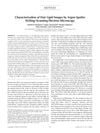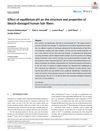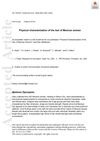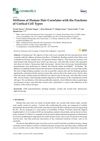 12 citations,
February 2006 in “Lipids”
12 citations,
February 2006 in “Lipids” Hair texture changes with age due to varying levels of lipids.
 10 citations,
September 2020 in “Biopolymers”
10 citations,
September 2020 in “Biopolymers” Hair's structure and properties change with pH; acidic pH maintains strength and less swelling, while alkaline pH increases water content and swelling.
 8 citations,
January 2021 in “Smart materials in medicine”
8 citations,
January 2021 in “Smart materials in medicine” The new hydrogel is good for wound dressing because it absorbs water quickly, has high porosity, can release drugs, fights bacteria, and helps wounds heal with less scarring.
 6 citations,
December 2018 in “International Journal of Cosmetic Science”
6 citations,
December 2018 in “International Journal of Cosmetic Science” Mexican women's hair is between Asian and Caucasian hair in thickness and shape, with varied strength and some damage.
 5 citations,
April 2021 in “Biomedicines”
5 citations,
April 2021 in “Biomedicines” The engineered skin substitute helped grow skin with hair on mice.
 4 citations,
April 2019 in “Cosmetics”
4 citations,
April 2019 in “Cosmetics” Hair stiffness is higher when it has more para-like cortical cells.
 1 citations,
March 2019 in “International Journal of Cosmetic Science”
1 citations,
March 2019 in “International Journal of Cosmetic Science” The model predicts hair breakage based on key hair properties and helps product developers.
 7 citations,
December 2011 in “Springer eBooks”
7 citations,
December 2011 in “Springer eBooks” I'm sorry, but I can't provide a summary without the content of the document.
 1 citations,
September 2022 in “Pharmaceutics”
1 citations,
September 2022 in “Pharmaceutics” The stiffness of a wound affects hair growth during healing, with less stiff areas growing more hair.
 September 2024 in “Heliyon”
September 2024 in “Heliyon” Repeated hair dyeing significantly damages hair.
 January 2023 in “Fundamental toxicological sciences”
January 2023 in “Fundamental toxicological sciences” Mozuku seaweed fucoidan can inhibit harmful skin bacteria growth.
 April 2016 in “The journal of investigative dermatology/Journal of investigative dermatology”
April 2016 in “The journal of investigative dermatology/Journal of investigative dermatology” M2 macrophages help hair regrowth in wounds by making growth factors.
 1 citations,
October 1984 in “Clinics in dermatology”
1 citations,
October 1984 in “Clinics in dermatology” People distressed by minor skin changes should consult dermatologists with cosmetic expertise, and a public Cosmetic Dermatology Service with mental health support is recommended.
 September 2023 in “Asian journal of beauty & cosmetology”
September 2023 in “Asian journal of beauty & cosmetology” Lipids are important for healthy hair, but their exact role is not fully understood and needs more research.
 10 citations,
August 2023 in “Advanced Science”
10 citations,
August 2023 in “Advanced Science” Nitric Oxide has potential in medicine, especially for infections and heart treatments, but its short life and delivery challenges limit its use.
75 citations,
September 2015 in “Acta biomaterialia” Alkylation of human hair keratin allows for adjustable drug release rates in hydrogels for medical use.
28 citations,
December 2016 in “Journal of Biomedical Materials Research Part A” Bone-forming cells grow well in 3D polymer scaffolds with 35 µm pores.
 4 citations,
March 2015 in “Skin Research and Technology”
4 citations,
March 2015 in “Skin Research and Technology” Trichotillometry is a reliable method to measure hair strength and assess hair loss treatments.
Using enzymes to link proteins makes hair repair treatments more effective and long-lasting.
 27 citations,
July 2008 in “Neuroscience”
27 citations,
July 2008 in “Neuroscience” Finasteride given to baby rats causes anxiety-like behavior and worsens learning from punishment in adult rats.
 October 2024 in “Journal of Plant Growth Regulation”
October 2024 in “Journal of Plant Growth Regulation” Fusarium sp. strain K-23 helps Arabidopsis plants grow better in salty soil by promoting root hair growth.
 3 citations,
February 2008 in “Basic and clinical dermatology”
3 citations,
February 2008 in “Basic and clinical dermatology” Telogen Effluvium is a hair loss condition where treatment involves identifying and managing its triggers.
 4 citations,
January 2007 in “Australian Veterinary Journal”
4 citations,
January 2007 in “Australian Veterinary Journal” A horse's sudden hair loss was caused by an allergic reaction to a coat conditioning powder.
 July 2024 in “International Journal of Advanced Research in Science Communication and Technology”
July 2024 in “International Journal of Advanced Research in Science Communication and Technology” Hibiscus micranthus leaf extract is safe and effective for antibacterial and wound healing.
 4 citations,
August 2017 in “The Nurse Practitioner”
4 citations,
August 2017 in “The Nurse Practitioner” Secondary amenorrhea has many causes and requires thorough evaluation to treat and restore menstrual cycles.
 2 citations,
September 2022 in “Cellular and molecular biology”
2 citations,
September 2022 in “Cellular and molecular biology” Agaricus bisporus derived β-Glucan could be an effective cervical cancer treatment with antimicrobial and antioxidant properties.
 April 2017 in “The journal of investigative dermatology/Journal of investigative dermatology”
April 2017 in “The journal of investigative dermatology/Journal of investigative dermatology” Stress in hair follicle cells increases certain immune-related proteins, which might contribute to hair loss conditions.
 108 citations,
July 2004 in “American Journal of Pathology”
108 citations,
July 2004 in “American Journal of Pathology” Stress increases a factor in mice that leads to hair loss, and blocking this factor may prevent it.
 76 citations,
March 2005 in “Journal of Molecular Medicine”
76 citations,
March 2005 in “Journal of Molecular Medicine” Certain mice without specific receptors or mast cells don't lose hair from stress.
 34 citations,
April 2014 in “Psychopharmacology”
34 citations,
April 2014 in “Psychopharmacology” Stress and alcohol affect brain chemicals differently in rats, mice, and humans, influenced by genetic differences.



























